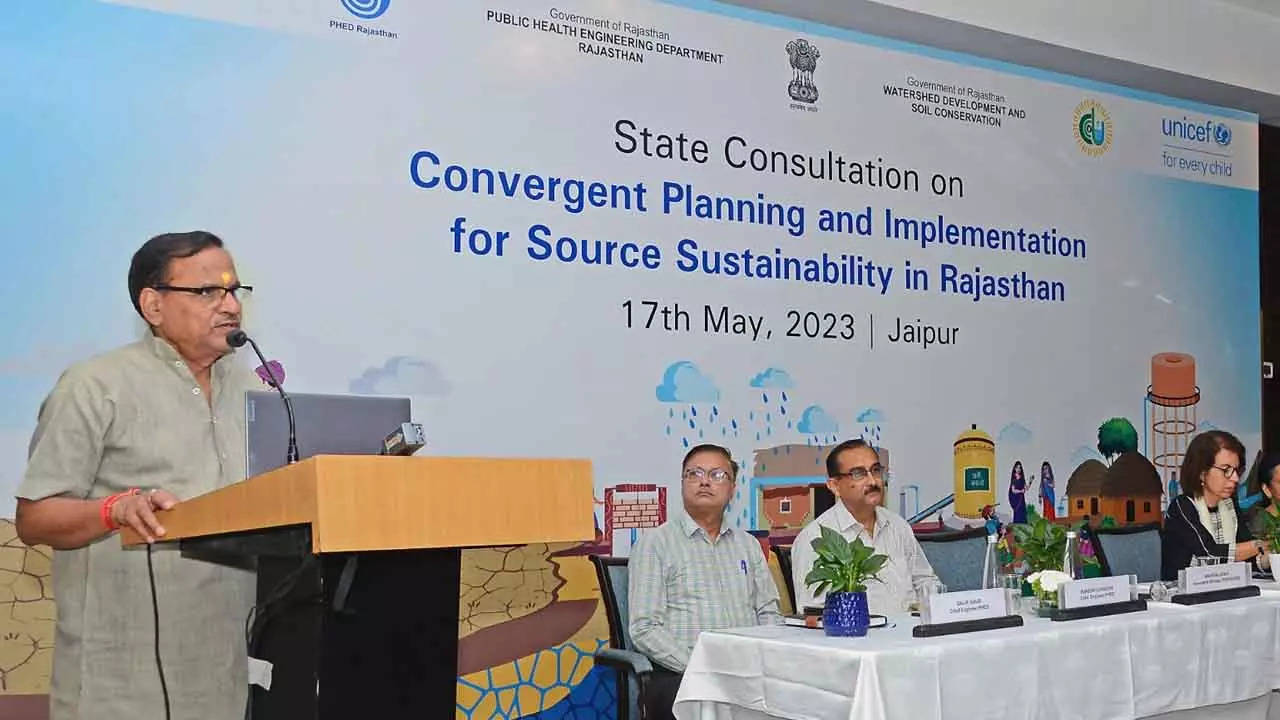Rajasthan
Mahesh Joshi: Rajasthan PHED minister Mahesh Joshi bats for chapters on water conservation in school textbooks | Jaipur News
JAIPUR: State Public Health and Engineering Department (PHED) minister – Mahesh Joshi – on Tuesday stated that the department would soon send a proposal to the Education Department to include chapters on water conservations and utilisation in school textbooks.
“The way villagers from the remote districts of Bikaner, Barmer or Jaisalmer conserve and utilise water at households, it’s a subject to study. I am sorry to say, ‘educated’ urban population of Rajasthan do not have any ideas to conserve and utilise water. So, I am sending a proposal to the Education Department to introduce chapters on water conservation and utilization in school textbooks,” said Mahesh Joshi.
The minister stated that a team of engineers from the PHED and Ground Water Resources Department would pen down the chapters in a simple way to make school students understand the purpose of water conservation and the right way to utilise water. The chapters would include all slogans of all the water-related departments of the government.
Joshi was attending a conference on Convergent Planning and Implementation of Source Sustainability in Rajasthan, where he made this statement.
“You cannot create water in laboratories. This is a natural product. You can only conserve and utilise water properly to save for the future,” added Joshi.
Talking about Rajasthan’s ‘poor performance’ in Jal Jeeven Mission (JJM) projects, the minister stated that the state performance is highly appreciable.
“Whatever might be the parameters of the union government, PHED Rajasthan has done an excellent job in JJM connections, considering the topography of the country. No other states in India have so varied and remote topography. While average per connection cost in other states ranges between Rs 5,000 to Rs 7,000, in Rajasthan it is Rs 70,000,” said Joshi.
Present on this occasion, director of the state Watershed Department, Reshma Gupta stated that her department is presently working on two major projects to conserve water through rainwater harvesting in around 50,000 villages of the state.
“Whatever project the Watershed Department undertakes is done through geo-tagging. I would propose that all water-related departments of the state should upload these geo-tagging on one website for better coordination towards conservation,” said Gupta.
“The way villagers from the remote districts of Bikaner, Barmer or Jaisalmer conserve and utilise water at households, it’s a subject to study. I am sorry to say, ‘educated’ urban population of Rajasthan do not have any ideas to conserve and utilise water. So, I am sending a proposal to the Education Department to introduce chapters on water conservation and utilization in school textbooks,” said Mahesh Joshi.
The minister stated that a team of engineers from the PHED and Ground Water Resources Department would pen down the chapters in a simple way to make school students understand the purpose of water conservation and the right way to utilise water. The chapters would include all slogans of all the water-related departments of the government.
Joshi was attending a conference on Convergent Planning and Implementation of Source Sustainability in Rajasthan, where he made this statement.
“You cannot create water in laboratories. This is a natural product. You can only conserve and utilise water properly to save for the future,” added Joshi.
Talking about Rajasthan’s ‘poor performance’ in Jal Jeeven Mission (JJM) projects, the minister stated that the state performance is highly appreciable.
“Whatever might be the parameters of the union government, PHED Rajasthan has done an excellent job in JJM connections, considering the topography of the country. No other states in India have so varied and remote topography. While average per connection cost in other states ranges between Rs 5,000 to Rs 7,000, in Rajasthan it is Rs 70,000,” said Joshi.
Present on this occasion, director of the state Watershed Department, Reshma Gupta stated that her department is presently working on two major projects to conserve water through rainwater harvesting in around 50,000 villages of the state.
“Whatever project the Watershed Department undertakes is done through geo-tagging. I would propose that all water-related departments of the state should upload these geo-tagging on one website for better coordination towards conservation,” said Gupta.





